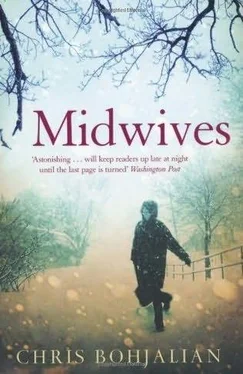Chris Bohjalian - Midwives
Здесь есть возможность читать онлайн «Chris Bohjalian - Midwives» весь текст электронной книги совершенно бесплатно (целиком полную версию без сокращений). В некоторых случаях можно слушать аудио, скачать через торрент в формате fb2 и присутствует краткое содержание. Жанр: Современная проза, на английском языке. Описание произведения, (предисловие) а так же отзывы посетителей доступны на портале библиотеки ЛибКат.
- Название:Midwives
- Автор:
- Жанр:
- Год:неизвестен
- ISBN:нет данных
- Рейтинг книги:5 / 5. Голосов: 1
-
Избранное:Добавить в избранное
- Отзывы:
-
Ваша оценка:
- 100
- 1
- 2
- 3
- 4
- 5
Midwives: краткое содержание, описание и аннотация
Предлагаем к чтению аннотацию, описание, краткое содержание или предисловие (зависит от того, что написал сам автор книги «Midwives»). Если вы не нашли необходимую информацию о книге — напишите в комментариях, мы постараемся отыскать её.
Midwives — читать онлайн бесплатно полную книгу (весь текст) целиком
Ниже представлен текст книги, разбитый по страницам. Система сохранения места последней прочитанной страницы, позволяет с удобством читать онлайн бесплатно книгу «Midwives», без необходимости каждый раз заново искать на чём Вы остановились. Поставьте закладку, и сможете в любой момент перейти на страницу, на которой закончили чтение.
Интервал:
Закладка:
School had not been canceled that day, but the first classes had been pushed back two hours to allow the road crews time to turn the winding ice rinks throughout northeast Vermont back into roads. And so my father left for work before I left for school.
Charlotte Fugett Bedford and her son Veil went their separate ways soon after Veil was born. Charlotte's body was rushed in the funeral director's van to Burlington after the state's attorney and the medical examiner had surveyed the bedroom, and the state police had taken the sorts of postpartum photographs that are blessedly uncommon. The medical examiner informed my mother that he would be performing an autopsy when the body and he had returned to Burlington, but he said it was a standard practice and nothing that should alarm her.
My mother, Asa, and Anne actually left the Bedfords' before the men in suits and uniforms. They were still roaming around the bloody mattress and dropping items-wet rubber gloves, dry specks of herb tea, a clean syringe, a bloody washcloth-into clear plastic sandwich bags when Veil was taken to North Country Hospital in Newport, where pediatricians could examine him carefully. It was from the hospital that my mother phoned my father at his office and told him what had occurred. Her plan was to tell me in person when I returned home from school.
Like everything else surrounding the birth of Veil Bedford, it didn't work out as my mother expected. News of accidental death, especially when it is grisly, travels fast in our corner of Vermont. Collisions involving pickup trucks and cars that result in fatalities, logging disasters with chain saws or skidders, drownings in the deep waters of the nearby gorge all encourage conversation. When people die, people talk-especially teenagers.
Consequently, I learned of Charlotte Bedford's death during gym class, just before lunch. We had played volleyball that morning.
When I first heard the news, the story did not include my mother. Perhaps if the strange ways in which rumor and reality are linked could ever be severed and the separate parts dissected, their histories would show that I was the individual who first incorporated Sibyl Danforth into the tale-at least in my school, at least among the teenagers in our county.
I was changing from my gym shorts to blue jeans when Sadie Demerest told me, "That weird preacher up in Lawson lost his wife-that one from the South." Her voice was unconcerned and natural, as if she were telling me of another student's fashion faux pas-a girl with a sweater that was a tad too formal for school, or an unnatural streak of black in her hair that was just a bit too punk.
"She died?" I asked.
"Yup. In childbirth."
And I murmured aloud a thought that I do not believe had yet passed through Sadie's mind, although it certainly would have soon enough. "I wonder if my mother was there," I said.
Sadie paused on the bench before her locker, her own jeans still in her lap.
"Your mom was her midwife?" she asked after a long moment, and I nodded. The sounds in the changing room-the water rushing in the showers a few yards away, the giggles and laughter from the other girls, the tinny thump of the metal lockers as they were opened and closed-seemed to disappear as Sadie stared at me. At that moment I did not understand the full magnitude of the way my life was about to change, but the first dark inklings were beginning to coalesce.
I could see that the idea that my mother might have been present frightened Sadie and changed her perception of the story dramatically. Suddenly, this was no longer a tragedy with anonymous players, a horror story sufficiently distant to allow casual appreciation of its core gruesomeness. This little nightmare involved Connie Danforth's mother. Connie Danforth's mother had been with the dead woman. Connie Danforth's mother had not only been with the dead woman, she had been helping her have her baby.
And people weren't supposed to die having babies, not even in our rural corner of the Kingdom. And so Sadie asked me the question that everyone in the county would ask one another for months, the question that no one was able to answer fully at the trial and no one has been able to answer conclusively ever since. In Sadie's case, it was a rhetorical question, an inquiry she had to know I could not possibly answer. But it was a question she-like everyone else-was unable to resist asking.
Twisting the legs of her jeans in her hands, her skin growing pale before my eyes, Sadie asked, "Connie, what happened?"
When I got home from school, my father was in the kitchen. My mother was sleeping.
"How was school?" he asked. He was wearing the dress slacks and shirt he'd worn to work, but his necktie was gone-probably long gone by three-thirty in the afternoon. I imagined he'd been home for hours.
"Fine."
"Good, good," he said, his voice a numbed and distant monotone. I saw on the counter that someone had made a pot of coffee since I had left for school, but it didn't look as if anyone had touched it.
"You'll need to be gentle with Mom for a while," he then added.
"Because of what happened?"
He sat back in the wooden kitchen chair and folded his arms across his chest. "What have you heard?"
"I heard Mrs. Bedford died."
He shook his head sadly. "Why don't you put your books down and tell me what you know. Then I'll tell you what I know."
"The details?"
"If you don't already know them."
Throughout the afternoon, two notions had prevented me from hearing a word my English or history teachers had said. The first was that Foogie was now without a mother, and I couldn't imagine how the little boy would endure. At that point in my life, I had never met a child who didn't have a mother. The second was my fear that my family would suddenly become poor.
At thirteen I did not understand the details of how malpractice insurance worked, but I knew that Vermont midwives didn't carry any: There were no companies that offered it to them in the state. And I knew this was an issue on occasion between my parents, usually after my mother would return home from what she would describe as a complicated birth.
I think the afternoon after Charlotte Bedford died, this was my father's chief concern as well: a civil suit. I don't believe the idea that state troopers would be arriving at our home within hours had crossed his mind.
"So what have you heard?" he asked again when I had sat in the chair beside him. "What are people saying?"
"No one knows a whole lot. Mostly just that the southern preacher's wife died."
"In childbirth? Do they know she died in childbirth?"
"Uh-huh."
"Do they know your mother was attending?"
"Yup, they do." I didn't mention the fact that I was responsible for dropping that detail into the story as it circulated through the school.
"What else?"
"No one knew if the baby died, too. Did it?"
"No, the baby's alive and doing fine. They had a little boy."
"That's good, at least."
"It is, yes."
"What did they name it?"
"Reverend Bedford named him Veil," my father said, emphasizing the pronoun so that the object I'd called "it" would have a gender in my mind. "What else are people saying?"
"Like I said, no one really knows much. All I heard was that Mrs. Bedford had died in childbirth, and it was incredibly bloody. But I know childbirth is always bloody, and no one seemed to be able to tell me why."
"Why…"
"Why it was so bloody."
He toyed with one of his sideburns and then brought his fingers back to his chest. I realized I was sitting on my hands. "Who told you?" he asked.
"Sadie."
"Were a lot of kids talking about it?"
"Yup. By the end of the day, anyway."
"On the school bus?"
"I guess."
"Were the kids asking you a lot of questions?"
Читать дальшеИнтервал:
Закладка:
Похожие книги на «Midwives»
Представляем Вашему вниманию похожие книги на «Midwives» списком для выбора. Мы отобрали схожую по названию и смыслу литературу в надежде предоставить читателям больше вариантов отыскать новые, интересные, ещё непрочитанные произведения.
Обсуждение, отзывы о книге «Midwives» и просто собственные мнения читателей. Оставьте ваши комментарии, напишите, что Вы думаете о произведении, его смысле или главных героях. Укажите что конкретно понравилось, а что нет, и почему Вы так считаете.











